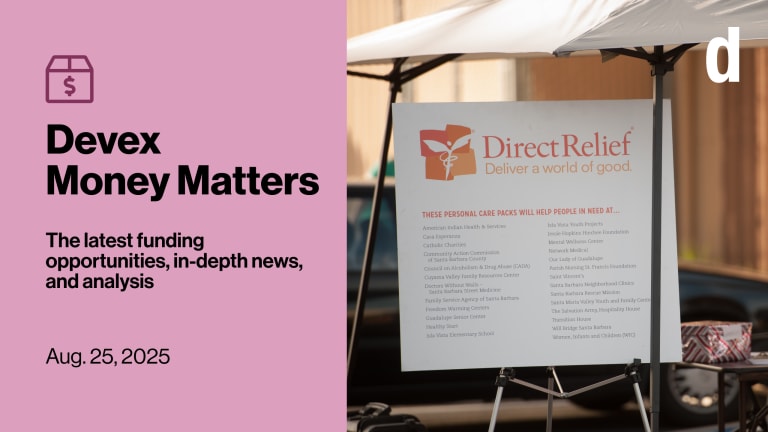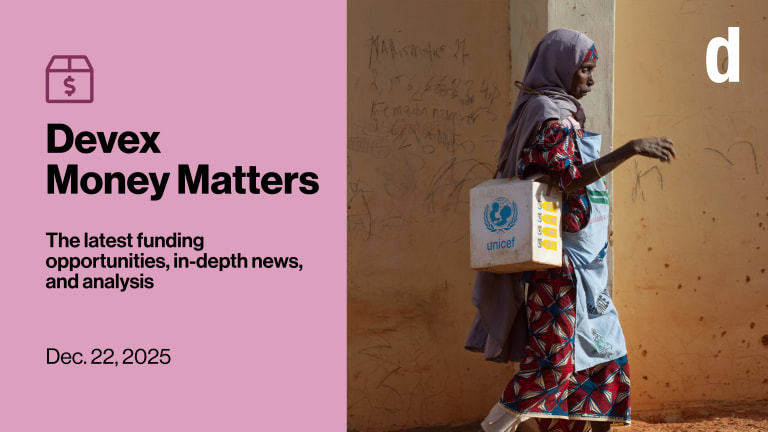
The Trump administration appears to have plans to cut back almost all of its funding to multilateral institutions, and agencies are bracing for budget cuts and big redundancy announcements. We take a look at how much the U.S. contributed to the system — and who the other big spenders are.
+ Are there topics you want to read more about in Money Matters? We want your feedback.
UNfunded?
For weeks, we’ve been hearing about how the United Nations and other multilaterals have been left reeling by cuts. Most recently, U.N. Secretary-General António Guterres announced plans for 20% job cuts in the U.N. secretariat.
In order to understand the impact better, we looked at OECD figures that show total spending on multilateral organizations.
We found that in 2023, the United States provided $27.5 billion — $5.2 billion in core contributions to multilaterals — unrestricted support for the organizations’ core activities, much of it mandated by treaty — and $22.3 billion in what is known as bi-multi aid – bilateral support, delivered on behalf of the U.S. by the multilateral system. That’s almost a quarter of the total funding, which is worth $107.6 billion.
Read: Who’s funding the multilateral system? (Pro)
Funding activity
We publish tenders, grants, and other funding announcements on our funding platform. Here are some of those viewed the most in the past 10 days.
The African Development Bank and the Green Climate Fund have signed $38.9 million financing agreements to support climate-resilient infrastructure for farmers in Togo.
The U.S. Department of State has released a tender for the purchase of an official vehicle in Brazil.
The International Labour Organization has launched a cash-for-work initiative to support the earthquake recovery in Myanmar.
The U.N. Development Programme is inviting companies to organize activities aimed at strengthening social cohesion and preventing conflict through youth engagement and interregional cooperation in Moldova.
The World Bank has announced a $42 million project for increased access to clean and reliable electricity in Micronesia.
+ Try out Devex Pro Funding today with a free five-day trial, and explore funding opportunities from over 850 sources in addition to our analysis and news content.
Ford focus
Our attention was drawn to the Ford Foundation earlier this year when its president took to the stage at the Skoll World Forum, the international gathering of social entrepreneurs, and called for widespread change in the philanthropic sector — longer term grants, more unrestricted funding, more focus on equity, and a lot less worrying about the sector’s transgenerational legacy.
So is Ford putting its money where its mouth is? To a certain extent, at least, yes. The Ford Foundation has given $1.4 billion to international causes over the past five years, fueled in part by an innovative social bond structure.
We take a look to see who was getting that funding.
Read: The top grantees of the Ford Foundation (Pro)
Unsteady state
We’ve been led to believe that the new center of development funding for the United States will be the State Department, which is slated in Trump’s “skinny budget” to provide more than $60 billion over the next two years, even after massive cuts.
So it’s not reassuring to see that the department is cutting more than 3,400 jobs, which looks to be a reduction of around 4%, if this fact sheet is correct.
My colleague Colum Lynch has all the details.
Read: State Dept overhaul to cut 3,400 jobs, recast focus on US values
Tah-da!
The African Development Bank has a new president: Sidi Ould Tah, the former economic affairs and finance minister of Mauritania.
Tah inherits the role from the high-profile Akinwumi Adesina, who during a decade in charge tripled the bank’s capital to $318 billion.
Tah, along with runners-up Samuel Munzele Maimbo of Zambia and Amadou Hott of Senegal, co-authored a recent Devex opinion piece arguing that South Africa’s upcoming presidency of the G20 offers a chance to reform the global financial system to more fairly price the risk of African economies.
Read: Mauritania’s Sidi Ould Tah elected African Development Bank president
Opinion: Africa’s cost of capital crisis is a G20 test of global fairness
What’s FfD4 4?
In recent weeks, the initials FfD4, which stand for the Fourth International Conference on Financing for Development, seem to have appeared more and more often in the development chat. But it’s been a decade since FfD3, and many of us — even those with more than a decade in the sector — have likely forgotten many of the finer details.
Happily, my colleague Jesse Chase-Lubitz has penned a reminder of everything that’s come before, and what the big issues are on the agenda this time.
It is a pretty big deal, it turns out — a seminal conference in the future of development funding. Devex will be there watching, and we’d love you to come along and join us.
Read: What is Financing for Development 4 and why is it a big deal? (Pro)
+ With debt pressures mounting and aid budgets shrinking, the upcoming FfD4, in Seville, Spain, isn’t just another summit — it’s where development’s financial future could be rewritten. Ahead of the talks, Devex Pro is hosting a special online event series to unpack what’s really at stake.
Tomorrow, June 3, Iolanda Fresnillo, David Grigorian, Eric LeCompte, and Hannah Ryder will discuss the politics, power dynamics, and reform proposals shaping the global debt conversation. Save your spot now.
And on June 5, British International Investment’s Chris Chijiutomi goes behind the scenes on investing in fragile African markets — and what DFIs need to succeed where aid is retreating. Register now for this event.
Network news
Philanthropic networks are growing more common. They’re meetings of like-minded organizations that are looking to fund in partnership and share best practices, and they’re important gathering places for foundations to work together to best serve the groups they fund. Networks deserve much of the credit for still-nascent developments such as joint application processes, pooled funds, and increased core contribution levels.
But how should fundraisers and business development professionals best engage with these networks? My colleague Raquel Alcega met with three network convenors to find out.
Read: What funders and fundraisers can learn from philanthropic networks (Pro)
+ Curious about the insights that drive global development? Experience the power of Devex Pro with a 15-day free trial. Explore expert analyses, unlock hidden funding opportunities, connect with key players at exclusive events, and access a wealth of knowledge you won't find anywhere else.








